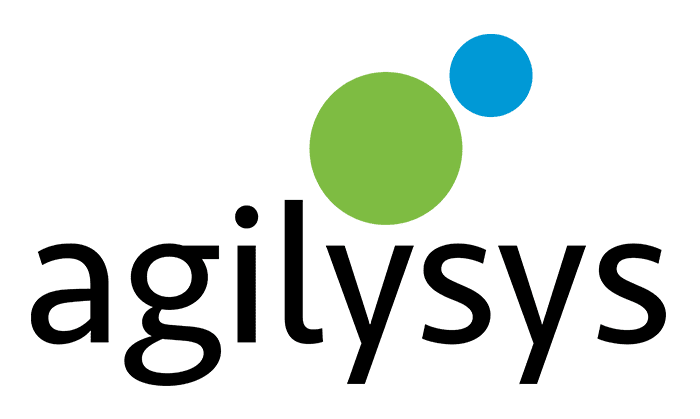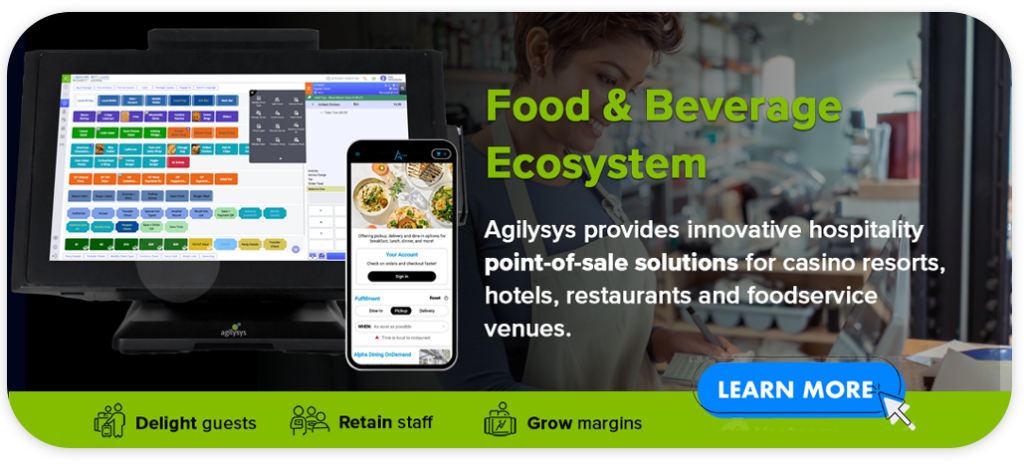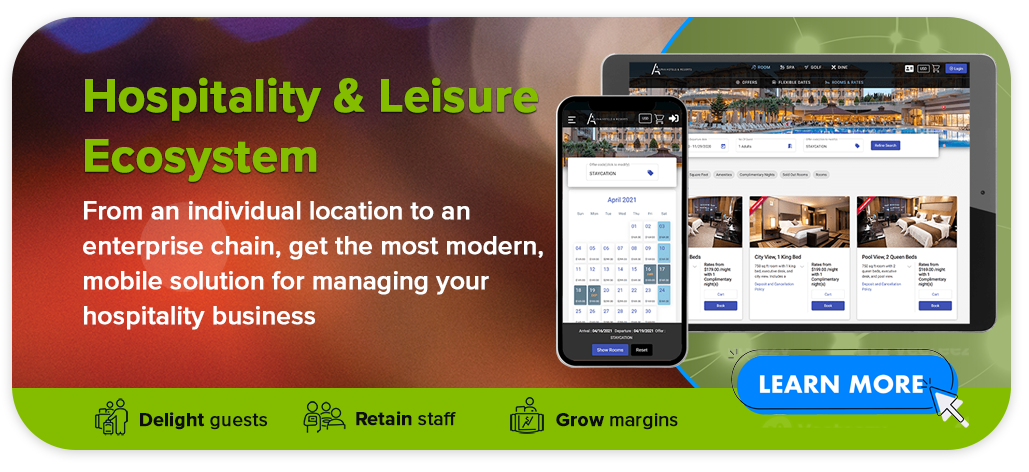
- Solutions
- Food & Beverage Ecosystem
Food & Beverage Ecosystem
Optimizing food & beverage operations and profitability demands a flexible, enterprise-class point-of-sale system. Is yours up to the task?
Go- Hospitality & Leisure Ecosystem
Hospitality & Leisure Ecosystem
From an individual location to an enterprise chain, get the most modern, mobile solution for managing your hospitality business
Go
- Inventory & Procurement Ecosystem
Inventory & Procurement Ecosystem
Designed to optimize foodservice and retail inventory and procurement operations for hotels, resorts, universities, restaurants and others.
Go
- Professional Services
Professional Services
Hospitality businesses are global, 24/7 operations with complex technology demands. You don’t have to go it alone.
Go
- Solution Studios
- Hotels
Hotels
Whether you operate a single boutique location or a large hotel chain, there’s an Agilysys hotel solution for you.
Go- Resorts
Resorts
Whether you operate a single boutique location or a large complex resort, your property is a unique operation that requires robust solutions supported by an experienced technology partner
Go
- Casinos
Casinos
You’re more than a gaming operation. You’re a full-service casino resort property and success isn’t about playing the odds, it’s about making the most of every revenue opportunity.
Go
- Tribal Gaming
Tribal Gaming
A leader in casino hospitality management solutions who respects the sovereignty of your nation.
Go
- Cruise Lines
Cruise Lines
Smooth seas ahead: technology solutions from Agilysys, a leader in cruise management systems.
Go
- Higher Education
- Corporate Dining
Corporate Dining
Identify emerging dining trends while aligning coverage with demand and capturing more revenue.
Go
- Healthcare
Healthcare
Delight patients & visitors, retain staff and grow margins with a suite of hospitality solutions for healthcare environments.
Go
- Life Plan Communities
- Foodservice Management
Foodservice Management
End-to-end foodservice management software solutions for optimum productivity and profitability.
Go
- Stadiums
- Restaurants
- Airports
Airports
Optimizing dozens of food & beverage outlets throughout your facility demands world-class POS performance combined with real-time operating insights.
Go
- Resorts
- Resources
- Articles
Articles
Access our library and read about the latest in emerging technology and other hospitality trends. Find tips and insights on accelerating business growth and improving guest satisfaction.
Go- Customer Stories
Customer Stories
Learn why so many businesses, small and large, partner with Agilysys for their hospitality technology needs.
Go
- Customer Videos
Customer Videos
Watch and learn what Agilysys customers have to say about their experiences with our solutions.
Go
- Product Resources
Product Resources
An in-depth collection of product information and datasheets. Read about the latest in hospitality technology features designed to solve the challenges faced by hospitality professionals around the globe.
Go
- Product Showcase
Product Showcase
Hear from industry professionals about the latest advancements, including tips and tricks, in hospitality and emerging technologies. Check out the library of demo videos and webinar recordings.
Go
- Webinars
Webinars
Watch and learn about the latest in successful technology trends and hear from hospitality professionals in this selection of interactive videos.
Go
- Industry Reports
Industry Reports
Important research and studies from across the hospitality industry. Find out what thought leaders are saying.
Go
- Customer Stories
- Company
- Leadership
- Solution Partners
Solution Partners
Agilysys has a broad collection of partners and APIs to help you assemble the perfect solution for you.
Go
- Our Customers
Our Customers
Discover how Agilysys customers like you are using our solutions to improve their business and guest experience.
Go
- Investor Relations
- News
- Events
Events
With the Agilysys commitment to 100% Hospitality solutions, we take industry events and conferences seriously. Please see where you can find Agilysys to learn more.
Go
- Career
- FAQS
FAQS
Go
- Solution Partners
- Support
- Contact Support
- Microsoft Patch Testing
Microsoft Patch Testing
See what Microsoft products and versions are currently support by Agilysys.
Go
- Payment Center
- RMA Requests
- Supply Order
Supply Order
Go
- Hospitality IQ
Hospitality IQ
Go
- Knowledge Center
Knowledge Center
Go
- Microsoft Patch Testing
- Blogs
- MyAgilysys
-
 Get a Demo
Get a Demo 877 369 6208
877 369 6208
×Home
☰- Explore
WHAT'S THE BUZZ IN HOSPITALITY?
How Modern Hoteliers Can Optimize Revenue in a Competitive Market
The hospitality industry is evolving at a rapid pace, and for hoteliers, staying competitive in a crowded market requires innovative strategies and the adoption of cutting-edge technologies. With shifting guest expectations, fluctuating demand, and increasing competition from alternative accommodations, modern hoteliers must prioritize revenue optimization to maintain profitability and growth. In today’s highly competitive market, it’s no longer enough to simply fill rooms; hoteliers must focus on maximizing revenue through effective pricing, enhanced guest experiences, and operational efficiencies. In this article, we will explore key strategies that modern hoteliers can implement to optimize revenue and stay ahead in the industry.

1. Embrace Dynamic Pricing Strategies
One of the most effective ways to optimize revenue is through dynamic pricing, which adjusts room rates in real-time based on market conditions, demand fluctuations, competitor pricing, and other external factors. Traditional pricing models that rely on fixed rates are no longer sufficient in today’s competitive market. By using advanced revenue management systems (RMS), hoteliers can dynamically adjust their pricing to match demand, ensuring they charge the right price at the right time.
For example, during high-demand periods such as holidays, local events, or peak seasons, prices can be increased to capture more revenue. Conversely, during low-demand times, prices can be lowered to encourage bookings and fill empty rooms. Dynamic pricing not only maximizes revenue but also allows hoteliers to remain competitive by offering attractive rates based on the ever-changing market landscape.
2. Utilize Revenue Management Systems (RMS)
Revenue Management Systems (RMS) are powerful tools that help hoteliers make data-driven decisions to optimize pricing, forecasting, and inventory management. By using RMS, hoteliers can predict demand patterns, track competitor pricing, and determine the best pricing strategies to maximize revenue.
RMS tools typically incorporate artificial intelligence (AI) and machine learning algorithms to analyze large volumes of data and provide insights into booking trends, customer behavior, and occupancy rates. These insights can help hoteliers make informed decisions about pricing, promotions, and inventory management. For instance, an RMS can automatically adjust room rates based on demand predictions, helping hoteliers avoid overpricing or underpricing.
With the right RMS, hoteliers can optimize their room availability, create personalized offers, and adjust their pricing dynamically, leading to higher revenue and a better understanding of their market.
3. Enhance the Direct Booking Experience
While Online Travel Agents (OTAs) are valuable for reaching a broader audience, they often come with hefty commissions that eat into a hotel’s profit margin. To optimize revenue, modern hoteliers must focus on driving direct bookings through their own website and booking engine.
A seamless, user-friendly booking experience is crucial for encouraging direct bookings. Hotel websites should be optimized for mobile devices, with intuitive navigation, fast loading times, and easy access to room availability and pricing. Offering exclusive benefits, such as discounted rates, free breakfast, or complimentary upgrades for guests who book directly, can incentivize travelers to bypass OTAs and book directly with the hotel.
Additionally, implementing a customer relationship management (CRM) system can help hoteliers nurture relationships with previous guests, offering personalized promotions and encouraging repeat bookings. By building loyalty and trust, hotels can reduce their reliance on OTAs and retain a larger share of their revenue.
4. Leverage Ancillary Revenue Streams
Hotels can significantly increase their revenue by focusing on ancillary services beyond room bookings. These additional services can include everything from food and beverage offerings, spa treatments, and parking fees to event spaces, tours, and excursions.

For instance, offering room service, themed dining experiences, or spa packages can provide guests with an enhanced stay while contributing to hotel revenue. Hoteliers should also look for ways to promote these services during the booking process, such as offering discounted or bundled packages that include meals, activities, or spa treatments.
Additionally, hosting events such as weddings, conferences, and concerts can help hotels generate additional income, especially if the hotel offers specialized venues and services for these events. By diversifying revenue streams, hoteliers can reduce their reliance on room sales alone and ensure steady revenue throughout the year.
5. Optimize Distribution Channels
In today’s digital age, optimizing distribution channels is critical to maximizing revenue. Hoteliers need to manage their presence across multiple platforms, including OTAs, metasearch engines, and global distribution systems (GDS), to ensure their hotel reaches a wide audience. However, managing these channels manually can be time-consuming and inefficient.
A channel manager allows hoteliers to synchronize room availability, pricing, and promotions across all online distribution channels in real-time. This prevents overbooking, ensures that the hotel’s inventory is properly represented, and helps avoid discrepancies in pricing. By using a channel manager, hotels can maintain rate parity across platforms, increase visibility, and reduce the risk of relying too heavily on one distribution channel.
In addition to OTAs, hotels should also leverage their social media presence and paid advertising campaigns to increase brand awareness and drive traffic to their website. By targeting the right audience through personalized marketing, hotels can improve their direct bookings and increase overall revenue.
6. Focus on Guest Experience and Personalization
In today’s competitive market, providing an exceptional guest experience is crucial for encouraging repeat bookings and building brand loyalty. Modern travelers expect personalized services and experiences that cater to their individual preferences.

Hotels can use guest data, such as booking history and preferences, to offer tailored services, such as room upgrades, special amenities, or customized welcome gifts. Personalization can extend beyond just the room—offering personalized recommendations for local attractions, dining options, and activities can elevate the guest experience and encourage guests to spend more during their stay.
Hotels should also actively seek guest feedback through post-stay surveys, online reviews, and social media to identify areas for improvement. By addressing guest concerns and continuously improving the guest experience, hotels can build a loyal customer base and increase the likelihood of repeat bookings.
7. Implementing Sustainable Practices
Sustainability is becoming a significant concern for modern travelers, with many preferring to stay in eco-friendly hotels. By implementing sustainable practices, hoteliers can not only contribute to environmental conservation but also attract eco-conscious guests willing to pay a premium for sustainable accommodations.
Sustainability initiatives can include reducing energy consumption, minimizing waste, using eco-friendly products, and sourcing locally produced goods. Hotels can promote their sustainability efforts through marketing and branding, attracting guests who value environmental responsibility.
Conclusion
In a competitive hospitality market, modern hoteliers must leverage every tool at their disposal to optimize revenue. From dynamic pricing and revenue management systems to enhancing the guest experience and focusing on ancillary revenue streams, there are numerous strategies that can help hotels increase profitability. By embracing technology, personalization, and sustainability, hotels can not only meet guest expectations but also stay ahead of the competition and thrive in a rapidly evolving market.

2026 Hospitality Industry Conferences You Shouldn't Miss
Read More
The 2025 Global Hospitality Study
Download Study
The Guest Economy: Top 5 Hospitality Technology Predictions for 2026
Learn MoreCategories
- Contact Support
- Leadership
- Articles
- Hotels
- Food & Beverage Ecosystem




